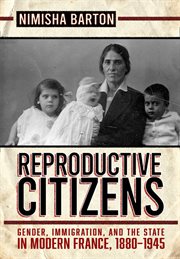Nonfiction
eBook
Details
PUBLISHED
Made available through hoopla
DESCRIPTION
1 online resource
ISBN/ISSN
LANGUAGE
NOTES
In the familiar tale of mass migration to France from 1880 onward, we know very little about the hundreds of thousands of women who formed a critical part of those migration waves. In Reproductive Citizens, Nimisha Barton argues that their relative absence in the historical record hints at a larger and more problematic oversight-the role of sex and gender in shaping the experiences of migrants to France before the Second World War. Barton's compelling history of social citizenship demonstrates how, through the routine application of social policies, state and social actors worked separately toward a shared goal: repopulating France with immigrant families. Filled with voices gleaned from census reports, municipal statistics, naturalization dossiers, court cases, police files, and social worker registers, Reproductive Citizens shows how France welcomed foreign-born men and women-mobilizing naturalization, family law, social policy, and welfare assistance to ensure they would procreate, bearing French-assimilated children. Immigrants often embraced these policies because they, too, stood to gain from pensions, family allowances, unemployment benefits, and French nationality. By striking this bargain, they were also guaranteed safety and stability on a tumultuous continent. Barton concludes that, in return for generous social provisions and refuge in dark times, immigrants joined the French nation through marriage and reproduction, breadwinning and child-rearing, in short, through families and family-making, which made them more French than even formal citizenship status could
Mode of access: World Wide Web







